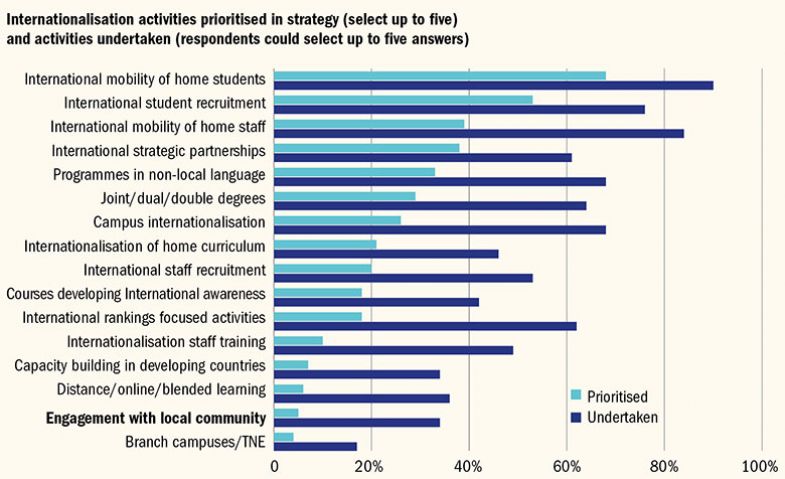An overwhelming majority of European universities are failing to engage with their local communities on international issues and there is a mismatch between institutions’ stated internationalisation goals and the activities that they pursue, according to a major study.
In a survey of university staff conducted by the European Association for International Education, just 5 per cent of respondents said that their institution prioritises engagement with local community and society on international issues, making it the second least common institutional internationalisation activity.
The study says that this is “perhaps a particularly important finding, given that recent rhetoric in the sector has underlined the need for [higher education institutions] to develop better approaches to engage with their local communities on international issues when responding to the rise of right-wing and anti-international sentiment in society”.
The report, The EAIE Barometer: Internationalisation in Europe, was based on a survey of 2,317 university staff across 1,292 institutions spanning the European Higher Education Area. Sixty per cent of respondents work in their institution’s international office, while 18 per cent self-identified as academics.
It provides an update to the first edition of the barometer, published in 2015 (although the answering option on engaging with local community was new to the 2018 edition of the survey).
Ross Hudson, a doctoral candidate at the University of Bath, senior knowledge officer at the EAIE and co-author of the study, said that if universities “decide they need to respond to the rise of nationalism debates…they’re going to have to think how to better engage with their local communities and the wider society, to get the message out there about the benefits of internationalisation”.
“That the study shows that engagement with local communities on international issues is a relatively low-priority activity within universities’ internationalisation strategies in the EHEA seems to indicate that there’s a gap there in the role that institutions are playing in translating the messages of internationalisation of higher education to wider society,” he said.
Anna-Malin Sandström, policy officer at the EAIE and lead author of the study, added that if internationalisation is going to be “fully mainstreamed within an institution”, it should support all three missions of universities, including the third mission of engaging with society. However, she noted, this activity is “not as quantifiable” as student mobility and student recruitment.
Uwe Brandenburg, managing director of the consultancy firm Global Impact Institute and associate professor for regional cooperation and impact of higher education at Spain’s Rovira i Virgili University, warned that universities must urgently address this gap.
“There is close to nothing happening in using higher education internationalisation systematically to address issues of populism, radicalisation, xenophobia and anti-intellectualism. Yet without doing that, we might not even have a society any more that will want to see any internationalisation,” he said.
The survey also found that preparing students for a globalised world and enhancing their employability has become the most common internationalisation goal in universities, selected by three-quarters of respondents (76 per cent) in 2018, up from less than half (45 per cent) in 2015. This rose to 90 per cent among respondents from western Europe and to 86 per cent among respondents working at universities of applied sciences, which may reflect the teaching and student-focused nature of these institutions.
Improving the quality of education, singled out as the most important reason to internationalise three years ago, is now second in the list although it was stated more often in 2018, cited by 65 per cent of respondents, up from 56 per cent in 2015.
Despite the ostensible importance that universities place on preparing students for a globalised world, internationalising the home curriculum and courses and activities developing students’ international awareness were only the eighth and 11th most frequently prioritised internationalisation activities.
Furthermore, while only 12 per cent of respondents cited financial benefits as a primary goal of internationalisation, international student recruitment (which generates significant revenue in many countries) was the second most prioritised activity.
The study said that most respondents reported that their universities prioritised relatively similar types of internationalisation activities – international student mobility opportunities and international student recruitment – despite differences in their stated institutional goals for the process.
Ms Sandström said that the findings raise the question of whether staff’s stated goals are “related to the actual internationalisation pursuit in practice” or instead represent a “socially desirable answer” or “jargon in the field”.
“We talk about enhancing quality, we talk about preparing students for a global world without maybe reflecting too much on what that then means in practice [and without] measuring or evaluating whether we actually achieve that with our internationalisation efforts,” she said.
Dr Brandenburg agreed that the results seem to indicate that “stated goals are not necessarily intended goals”.
“Sometimes things sound good, and one says it because everybody says it. But few institutions take this goal, as well as social responsibility, seriously and act on it,” he said.
International matters: EAIE barometer 2017

Elspeth Jones, emerita professor of internationalisation of higher education at Leeds Beckett University and an international education consultant, said that these results could reflect the fact that staff in international offices at universities might need to “convince senior leaders” and “the wider academic community” of pursuing certain internationalisation activities.
“International officers frequently see a need to internationalise the curriculum and may well be given the job of trying to engage academics in delivering this,” she said, adding that preparing students for a globalised world is often “interpreted [by academics] as being achieved through mobility rather than internationalisation of the curriculum at home”.
However, the results of the survey showed that the heads of international offices more often detailed student mobility (76 per cent) and staff mobility (48 per cent) as strategic priority activities, while academic staff more often reported courses developing students’ intercultural awareness (28 per cent).
“It appears as though professionals were more prone to view internationalisation activities in their own area of responsibility as institutional priorities,” the study says.
Professor Jones added that while mobility is seen by universities “as the easy option to deliver ‘global citizens’”, in part because of the success of the European Commission’s Erasmus+ scheme, it will “only ever be a solution for a minority of students”.
“University leaders count the number of incoming and outgoing students, seeing success as merely increasing those numbers rather than evaluating student learning outcomes from mobility. Internationalisation of the curriculum at home seeks to offer equivalent opportunities in domestic environments, focusing on the learning outcomes achieved rather than simply increasing the number of mobile students,” she said.
The survey also found that universities were moving away from a centralised model of internationalisation with a single international office towards a decentralised model with multiple offices working together on internationalisation. In 2015, half of respondents (51 per cent) said that their institution had a single international office, but just 35 per cent of respondents said the same in 2018.
However, just 53 per cent of respondents indicated that their university has an internal quality assurance system for internationalisation activities, with quality being assessed either systematically (33 per cent) or on an ad hoc basis (20 per cent).
POSTSCRIPT:
Print headline: Bring neighbours to the world party
Register to continue
Why register?
- Registration is free and only takes a moment
- Once registered, you can read 3 articles a month
- Sign up for our newsletter
Subscribe
Or subscribe for unlimited access to:
- Unlimited access to news, views, insights & reviews
- Digital editions
- Digital access to THE’s university and college rankings analysis
Already registered or a current subscriber?










